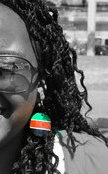Stereotypes and career in Kenya
When I returned home after my two-year master’s course, the only things of any value I had were my laptop and my camera. Before I got too worried about having to start life all over again, I quickly reminded myself of the non-material possessions that I came back with. One of those was living and learning with people from different cultures – almost like learning in the classroom of the world! I wish this was an experience everyone could have, especially those from my own country.
The 2007-2008 post-election violence is four or five years behind us, although images of that dreadful period are still fresh in some people’s lives. During the violence, education for scores of children was disrupted as communities fought against each other and people fled from their homes. Most schoolchildren, including my younger siblings, began to ask questions about which groups their classmates and their teachers came from as the situation deteriorated.
When I went to school as a child, I could not differentiate between my friends on the basis of which community they came from. In fact, because I attended a primary school in the country where majority of the population is from my ethnic group, I was always excited to meet and interact with classmates from other groups. In secondary school, which I attended in the capital, Nairobi, the mix of communities was very diverse. Learning in such environments was always every enriching.
Of course, this was not without the usual stereotypes. Some groups are well-known for certain skills and as a result are almost expected to take on a certain career. Some people do study according to their stereotypes, but not always. These stereotypes are because of their cultures, their economic activities or even how they interacted with the colonialists. For example, most of the people from my community are best known for being athletes, watchmen and police officers.
Our gift in athletics is probably first of all genetic. Second, our location in the highlands is said to be the best for athletes to train. As for being police officers and guards, this stems from the years of the former president Daniel Moi, who is said to have favored his own community. Most of those employed as police went through basic education and were assured of having jobs.
Other communities are known to be agile business people and traders, while others still are known to be academics. And some are known to be good farmers. Some teachers and even parents may also treat students differently especially if they strongly believe in the stereotypes and thus reinforce these while teaching or while at home. This may or may not affect one’s education. However, this is not a common practice – especially as our generation strives to steer away from tribalism.





